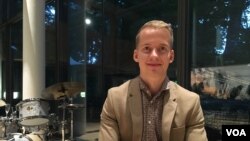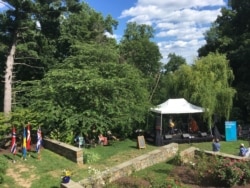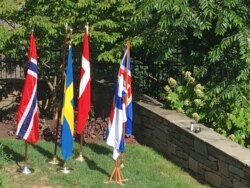The popular image of ambassadors as stuffy dignitaries in striped pants is giving way in Washington to a more upbeat vision, if the city’s Scandinavian envoys have anything to say about it.
At a cheery event a little earlier this summer, jazz artists from Denmark, Iceland, Norway, Sweden and Finland gathered in the garden of the Danish ambassador’s residence to participate in what is becoming one of the city’s summer rituals, the annual Nordic Jazz Festival, now in its 13th year.
“For Denmark, the relationship with American jazz goes all the way back to the early 1960s, when some of the world’s most iconic jazz artists found refuge in Denmark,” said Lone D. Wisborg, ambassador of Denmark to the United States.
Wisborg said that for decades, American artists including Stan Getz, Dexter Gordon and Ben Webster played highly successful roles as cultural ambassadors to Denmark, inspiring local performers and transforming “the sound of Danish Jazz” in the process.
“Diplomacy isn’t just about politics and economy,” Wisborg told VOA. “Some relations don’t need words.”
Finland, another Nordic country, hosted its own Nordic jazz event, featuring a trio led by 28-year-old Olli Soikkeli, a guitarist born in Finland who has lived in New York City for the past five years.
For Soikkeli, the event was a break from his hectic schedule that keeps him on the road much of the time, both in the U.S. and abroad.
“I have been to at least 30 states,” he said. “We do at least once a year a Midwest tour, go to Ohio, Illinois and all that, then West Coast, California, Washington state, Oregon, and then down south, we’ve even been to Alaska for two weeks.”
Because some of his fellow performers are from the New England area, Soikkeli says they also end up “playing a lot in Maine, Vermont, Massachusetts, New Hampshire.”
Wherever they go, Soikkeli says, they seldom find an audience that is unfamiliar with jazz. But he and his band are delighted to introduce certain styles of jazz that may be new to Americans, such as Gypsy jazz and Choro, sometimes described as “the New Orleans jazz of Brazil.”
Soikkeli says he “didn’t dig deep into American jazz” until he moved to New York five years ago. Back in Finland, Soikkeli’s main influence was Django Reinhardt, the Belgian-born Romani-French jazz guitarist and composer credited with creating the sound of Gypsy jazz in the 1930s.
“There’s definitely the before and after New York,” Soikkeli said. The Finnish native credits his time in America’s largest city with having helped him trace the roots of jazz.
“Everything comes from the blues. In my opinion, it doesn’t matter what type of jazz [an artist plays], you have to know the history of the blues, learn and build on it.” American swing and blues, Soikkeli says, have undoubtedly affected his “phrasing” when he plays the guitar.
New York, he says, is also a place “where you’re influenced by all these great musicians and all different strands of music.”
“In New York, everyone is from somewhere else,” he said. “I play these gigs in town; one night the drummer may be from Austria, the bass player from Brazil, the piano player from Japan, and the next day, the drummer is from Atlanta, Georgia, so it’s really a mix, a mix of people from all over the world.”
At the Finnish Embassy, Soikkeli was joined by Florida-born double bass player Paul Sikivie and drummer Rajiv Jayaweera, who grew up in Melbourne, Australia. “When we come together, [there is] definitely a sense of community,” he said.
Jazz is famously appreciated for showcasing each performer’s unique talent and ability to improvise. Yet when he and his fellow musicians go on stage, “we’re kind of having this conversation,” Soikkeli said. “It is like an American experience, in a way.”
If one listens carefully, it just might be possible to hear an echo of Finnish folk tunes in his music, Soikkeli adds. But “you’ve got to look for it.”











